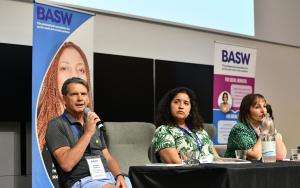'We were just literally abandoned and left on the streets after Grenfell'

Published by Professional Social Work magazine, 22 June, 2022
Five years after the Grenfell tragedy, the memories are still raw for Edward Daffarn. A social worker and resident of the tower block, he nearly lost his life when fire ripped through the building on the night of 14 June, 2017.
Writing in Out of the Shadows: The Role of Social Workers in Disasters, he describes his dramatic escape from the 16th floor of the tower block.
“I was on the verge of taking my last breath when a firefighter came through the door and dragged me out into the communal stairwell. Then I just ran for my life.”
As the inquiry into the disaster draws to an end, Edward spoke about his experiences and those of other survivors at BASW’s annual conference.
He said: “I've always described the Grenfell tower fire as a tragedy in three acts: the way that we were treated as a community beforehand; the night of the fire itself - the most violent, traumatic experience, it was just horrific; and how we were just literally abandoned and left on the streets afterwards. And that's no exaggeration.”
Edward slated the government handling of the disaster and the subsequent inquiry, saying: “Our experience with the government is one of incompetence and indifference.
“We cannot rely on the government to respond to any recommendations that are made in the public inquiry. And we are urging our lawyers to push for a recommendation that social work is organised in a way to respond to future disasters.
“But as we've seen from the recommendations from phase one of the public inquiry, disabled residents living in high rise buildings are in just as much danger now as they were before the Grenfell tower fire and that is absolutely totally unacceptable.
“And the fact that we're having so much difficulty even getting the recommendations of the public inquiry through is shameful.
“If we can't count on the government to implement the recommendations, and if Sir Martin More-Bick makes recommendations around social work being the appropriate agency to respond to disasters, then we need to take that responsibility on ourselves.”
Speaking about the night of the fire, which spread rapidly due to the building being clad in flammable material, Edward said: “The fire happened on a Tuesday evening. And it wasn't until the following Monday that the Westway Centre was opened as a meaningful kind of assistance centre. Even now, that's really difficult to deal with, that sense of abandonment.”
Zoe Dainton, a fellow survivor and committee member of campaign group Grenfell United, lived on the fourth floor of the building that had been her home for 25 years.
In the aftermath of the fire she says she felt “abandoned and left by the people who were meant to be looking after us”.
She recalls: “On one occasion we were placed on the eighth floor of a hotel after asking to be moved for weeks. After everything that we've been through, I just could not bear to be placed so high up. “Aside from this, there were only two single beds and there were three of us alternating in the floor. I even slept in the lobby sometimes. We were then moved to an even smaller room and I just absolutely lost it. I'm not an aggressive person, but I found my social worker and I screamed, I'd had enough.”
After Grenfell, Zoe went on to train as a social worker. Speaking at the conference, she called for local authorities to have a “crystal clear process” for social work responses to disasters so that “everyone knows what is expected”.
And she urged social workers to be honest with themselves about their ability to take on an emergency role: “It's important to own that you will need to give a lot of emotional support. You're going to have to act fast. You're going to have to expect the unexpected. You're going to hear from a family at five minutes to five you are crying their eyes out. It isn't enough to just want to help, you have to be in the right place to do so and to deliver a service.”
Out of the Shadows: The Role of Social Workers in Disasters, edited by Angie Bartoli, Marius Stratulis and Rebekah Pierre is published by Critical Publishing and available to buy now.
Our experience with the government is one of incompetence and indifferenceEdward Daffarn
